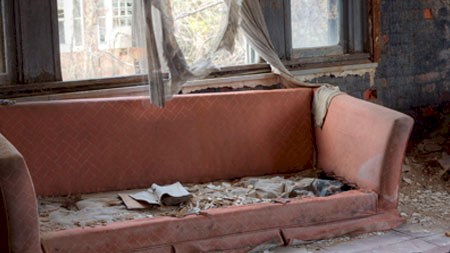Buying a new home can become a nightmare if the previous owner won’t leave. Find out your rights and how to evict them.
Unless you buy an investment property, you expect to be able to move into your home once it’s been transferred into your name. However, as recently reported in the Sunday Tribune, buying a repossessed home on auction can become a nightmare if the previous owners refuse to move out once the property has been sold.
The report makes for sad reading. Gale Nel paid R2-million at a sheriff’s auction for a home on the prestigious Camelot Estate in Hillcrest in September last year. The home had been repossessed, even though the previous owners had attempted to sell the property for R2.7-million at around the same time. The auction sale went through, but some 10 months later the previous owners are still refusing to vacate the home. So far, according to Nel, she has spent R400 000 on utility bills and lawyers.
“The transfer was done in December and since then they have been refusing to move out of the house,” said Nel.
Whenever I attempted to enter the property, they refused to let me in. I tried to get lawyers involved and the previous owners allegedly lied and said I had a verbal lease with them.
At this stage Nel is maintaining two homes and has been threatened with legal action should she attempt to remove the occupants from the property, despite the fact that they allegedly aren’t paying rent or utilities.
“They are living in my house free of charge and every month I have to pay at least R4 500 for the levy, plus the water and lights accounts they have racked up. In February, the water bill was R8 700, and I don’t know if they intentionally left the taps running just to spite me,” said Nel.
There are undoubtedly similar stories playing out across the country. Remember this is not a willing buyer/willing seller scenario. Those who have had their homes repossessed are often extremely reluctant to move out of the property, causing huge problems for the person who has subsequently bought the home. In addition to the fact that the new owner can’t take possession of the home, bond payments have to be paid by the new owner and if the property is on an estate, levies still have to be paid.
The correct name for a person who continues to occupy a property once a lease has ended or when the property has been sold is an ‘unlawful occupier’’. For some reason, many believe that it’s all but impossible to evict an unlawful occupier because they enjoy some sort of special right to remain on the property. This simply isn’t true and while it may take time for the wheels to turn in the eviction process, a homeowner will be able to get back what is legally his through the courts.
The one thing that needs to be remembered is that while our law doesn’t allow people to unlawfully occupy the property, it also doesn’t allow homeowners to take the law into their own hands by attempting to forcibly evict the occupants. As with any eviction, the owner may not turn off the lights and water, they may not remove the front door and they certainly can’t invoke the help of so-called ‘heavies’ in order to get the illegal occupiers off the premises. Those who use any of the above tactics could find that the courts will allow the unlawful occupier to move back into the property, forcing the owner to take the required legal steps and thus incurring more costs in the process.
Everything needs to be done by the book and that generally means that the owner is going to have to hire an attorney who is well-versed in the eviction process.
We asked Mark Millner a director with Alan Levy Attorneys, about some of the more commonly asked questions when it comes to evictions.
Q. Generally speaking, how long does it take for a successful eviction application to be finalised?
A. This is a difficult one because the answer is dependent on a number of factors. However, an unopposed eviction should take roughly 8-12 weeks, depending on the court.
Q. What sort of costs can a homeowner typically expect to pay?
A. An unopposed eviction will cost in the region of R15 000 – R25 000, but this is dependent on the attorney chosen.
Q. How soon after a homeowner becomes aware that an unlawful occupier is staying on his property can the owner start eviction proceedings?
A. The sooner the better, especially in instances of recalcitrant tenants as the longer they remain in default, the worse the prospects of recovery and thus the greater the loss.
Q. Is it possible for landlords to go through the eviction process alone, or is it wiser to use the services of an attorney? If the latter, why?
A. It certainly can be done without an attorney, especially if proceeding out of the Magistrate’s Court. However, there are certain technicalities in PIE which if not properly complied with will ruin/delay the entire application so it is thus better to use an attorney if possible.
Q. What defences can a squatter raise in court to delay and/or avoid eviction?
A. I have seen unlawful occupiers raise all kinds of defences, even forge sale agreements, but generally, the presiding officers are able to see through them. The biggest challenge in evictions is complying with the technical and statutory requirements.
Q. Is there any truth to the myth that a homeowner may not evict a person who has children, is disabled, or has elderly dependents?
A. This is not true at all. These are considerations that the presiding officer has to take into account when deciding on a just and equitable date for the unlawful occupiers to vacate, but they will not prevent an eviction order from being granted.
Q. If the landlord is successful in court, who performs the eviction?
A. The Sheriff of the Court
Q. What can a landlord do if the squatter engages in violent behaviour to avoid being evicted?
A. There are instances when a landowner can request an urgent eviction. This is mainly for instances where there will be or have been severe injuries to persons (including the unlawful occupier) or damage to property. This is an extreme step and the courts treat it as such, but in the right circumstances, it will give appropriate urgent relief. However, if the unlawful occupier is committing a crime, such as being violent, the police can still arrest them and charge them accordingly.



